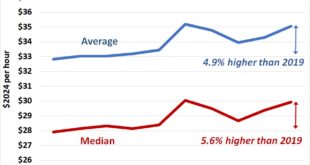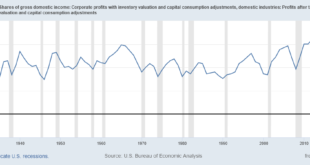A PLOG is a ´Persistent Large Output Gap´. Read: a long period of high unemployment. Literature about PLOGs tries to mitigate one of the ideas of economic orthodoxy, especially the unsubstantiated idea that lowering high post-economic crisis unemployment will fuel inflation. According to this literature, which is quite empirical, it doesn´t. However, this somewhat older literature does not yet consider the post-2009 Euro Area experience. Here, I will propose an updated definition of...
Read More »The Geology of Economics?
from Peter Radford This is something I need to get off my desktop. It’s just for fun … Asymmetry is the very beginning and end of an economy. It’s the bumps that matter. Explain them and you explain the economy. After all the very notion of exchange presumes differences between those involved, and difference is just another way off saying asymmetry. Sweep the bumps away with a broad brush of supposedly superb logic and you eliminate the very object of your study. That is if your...
Read More »Suggestions for a small experiment
Last week, I gave a presentation at the 2024 Australian Basic Income Fellows Workshop. Most of the talks were about Basic Income trials, which have been undertaken around the world. I focused on something more modest but perhaps more achievable: getting evidence on the effects of Scrapping or Scaling Back Mutual Obligation and Income Management. You can download the Powerpoint presentation here or see the slides on my Substack Share this:Like Loading...
Read More »Money for beginners
from Lars Syll Economists have sometimes misled us with their belief that it is their job to tell “white lies” to scare the population into “behaving themselves.” We think that is the wrong approach. This book trusts you, the reader, with that truth. We trust you to do what you can to spread the truth and to hold policymakers accountable. The truth is that government faces political constraints. It faces resource constraints. It faces technological constraints. But it does not, cannot,...
Read More »«Η έννοια της δομικής αλλαγής στα διαφορετικά ρεύματα της οικονομικής σκέψης και στην τρέχουσα οικονομική πολιτική» – Στ.Μαυρουδέας, 11-12-2024
Στα πλαίσια των σεμιναρίων του Τμήματος Κοινωνικής Πολιτικής που διοργανώνει το Εργαστήριο Κοινωνικής Πολιτικής (ΕΚοιΠ – https://socpollab.panteion.gr/) την Τετάρτη 11 Δεκεμβρίου 2024 (18:00-21:00) ο Σταύρος Μαυρουδέας (Καθηγητής, Τμ. Κοινωνικής Πολιτικής, Πάντειο Πανεπιστήμιο) θα παρουσιάσει εισήγησε με θέμα «Η έννοια της δομικής αλλαγής στα διαφορετικά ρεύματα της οικονομικής σκέψης και στην τρέχουσα οικονομική πολιτική». Τα σεμινάρια του ΕΚοιΠ είναι ανοικτά και διεξάγονται στην...
Read More »The Government And The Economy
[unable to retrieve full-text content]A well constructed government, at a minimum, provides its citizens FDR’s four freedoms: A good well constructed government would want what is best for the society or nation as a whole; understand that a healthy, well fed, well housed, well educated society or nation with a stable quality government is best. A well constructed, healthy […] The post The Government And The Economy appeared first on Angry Bear.
Read More »new issue of RWER
real-world economics review issue no. 109 download whole issue Culture – the elephant in the roomHardy Hanappi 22 The capitalization of everythingShimshon Bichler and Jonathan Nitzan 18 From the Bretton Woods system to global stagnationLeon Podkaminer 29 The role of internetization in creating sustainable development for the Global SouthConstantine E. Passaris 35 The works of Ha-Joon ChangJunaid B. Jahangir 56 A critique of Saito’s Slow Down; How degrowth communism...
Read More »The Hegseth dysfunction
[unable to retrieve full-text content]It seems that Hegseth may be forced to end his bid for Secretary of Defense due to his alcoholism and history of sexual abuse and mismanagement of nonprofits. On one level this is as it should be. I could probably live with Hegseth if he was well qualified for the job but got quietly soused […] The post The Hegseth dysfunction appeared first on Angry Bear.
Read More »Interrogating the ‘Vibecession’
There are encouraging signs that Canada’s economy and labour market are improving after a period of stagnation brought about by the Bank of Canada’s aggressive interest rate hikes in 2022 and 2023. Newly released data for the third quarter of 2024 (July-September) shows the economy has continued to grow, albeit slowly. Consumer spending was the brightest light in the third quarter data: growing at an annualized rate of 3.5% (in real, inflation-adjusted terms), and constituting the...
Read More »Capitalism and Democracy: The market is far more flexible than Christopher Caldwell imagines
from Dean Baker New York Times columnist Christopher Caldwell devoted his Thanksgiving piece to describing the German sociologist Wolfgang Streeck’s views on capitalism and democracy. I have not read much of Streeck’s work, but as recounted by Caldwell, he gets many of the basic facts about the U.S. economy badly wrong. According to Caldwell’s account, capitalists were willing to sacrifice profits in the decades after World War II for stability. This meant less dynamism but allowed...
Read More » Heterodox
Heterodox





